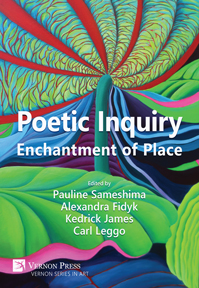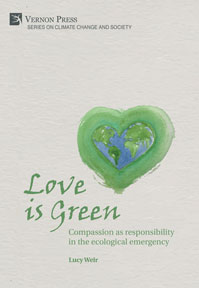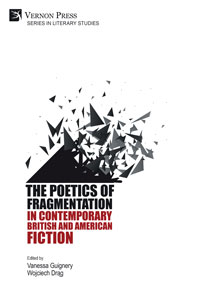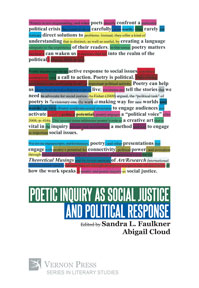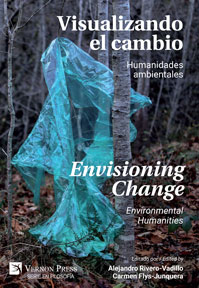Weaving Words into Worlds
Caroline Durand-Rous, Margot Lauwers (Eds.)
by Chloé Angué (University Paris Ouest Nanterre La Défense, France), Wes Berry (Western Kentucky University), Anne Cirella-Urrutia (Huston-Tillotson University), Asis De (Mahishadal Raj College, India), Stephen Greenfield (University of Wolverhampton), Hoffmann Catherine (University of Le Havre, France), David Latour (REMELICE - University of Orléans, France), David Lloyd (Le Moyne College), Maxime Petit (University of Toulouse 1 Capitole, France), George Piggford (Stonehill College), Peter Schulman (Old Dominion University), Adrian Tait , Keiko Takioto Miller (Mercyhurst University)
Purchase this book
(click here to change currency)
The collection makes an important contribution to the Environmental Humanities, spanning studies from literary and film ecocriticism to eco-spirituality and philosophy. The authors are drawn from a range of discourses and a range of cultural backgrounds - transAtlantic to postcolonial. In fact, the very idea of ‘weaving' honours indigenous approaches to storytelling.
The integrating theme of “Weaving Words into Worlds” is bridging 'the human and other-than-human worlds’ to deepen the 'sense of place.' This can be by done by travelling through desert landscapes or even wild gardens as 'spaces of entangled agencies'. For others, it is the experience of trauma that opens the path to re-enchantment.
Ariel Salleh
Ecofeminist activist and writer
Distinguished Visiting Scholar, Queen Mary University of London
“Weaving Words into Worlds” is a beautifully eclectic collection of fourteen ecocritical articles and some original ecopoetry, demonstrating that the experience of telling stories about our human lives as part of nature and in relation to the nonhuman world is intrinsic to our being. We are storytelling, image-making creatures. We derive meaning from experience through the diverse processes of poiesis. The effort to collect diverse artistic voices from various cultures throughout the world, as this book does, is of fundamental importance to the field. The particular contribution of this volume is in the very eclecticism of the texts examined in these articles, which range from traditional Polynesian mythology to contemporary, urban graphic novels, from films about wilderness retreat to nature writing that celebrates the rewilding of the world.
Dr. Scott Slovic
University Distinguished Professor of Environmental Humanities
University of Idaho
This rich volume brings together a wide array of ecocritical takes tied to the notion of reenchantment. Covering a variety of cultural backgrounds, it sparks a compelling conversation touching upon different worldviews, thus shedding a kaleidoscopic light on ecopoetic and spiritual attitudes that may help restore human wonder at the more-than-human world. This book provides much-needed readings of stories and ‘ecopoiesis,’ gesturing toward ways of reweaving human cultures, myths, and languages into the complex fabric of the world. Remedying some of the worst side-effects of the disenchanted epistemologies and ontologies brought upon the world by Modernity, the critics and artists brought together in this dense volume pave the way for a multifaceted reenchantment of the world, to be carried out in a self-reflexive way. It will prove of great appeal to scholars, teachers, and students of literature, cinema, poetry, and graphic novels, but also to non-academics with interest in contemporary readings of naturcultures in literature and visual arts. This book offers a timely contribution to the international research program at the University of Perpignan, France, on the ecopoetics of reenchantment. At a time when human societies are in great need of reconnection with the more-than-human world, with all its intricacies, its mysteries and intrinsic value, ‘Weaving Words into World’s makes headway into greener, more humble, ecopoetic, and self-aware ways of inhabiting the Earth.
Prof. Bénédicte Meillon
Head of the English Studies Department
University of Perpignan Via Domitia, France
EASLCE Vice-President
'Weaving Words into Worlds' comes as the third spinoff of the international ecopoetics conference organized in Perpignan in 2016. Reflecting upon how the many stories we tell directly influence the world we live in, each of the contributions in this international volume directs our attention to the constant, ecopoetic weaving of word to the world at work via the many entanglements between mind, matter, and meaning, whether on a local or a global scale. It encapsulates how the words, stories, and concepts we humans articulate as we try to make sense of the world we inhabit give part of its shape to the web of ecological relations that we depend on for survival. It seeks to cast light on the disenchanting and reenchanting powers of stories and poiesis in general—as stories retain the power to make us either become oblivious to and destroy or to feel and honor the many, complex ties between the multitudinous nature cultures intertwined within the fabric of a multispecies world always in the making.
This book offers a total of fourteen articles written by international scholars in ecocriticism and ecopoetics who, by their analyses of literature and/or films and the political subtext they thus render visible, aim at showing how the study of environmentally minded media may renew our attention to the entangled agencies of the human and the more-than-human realm. Thus, this work offers to counter a reproach ecocriticism has often been met with, namely the over-presence of US scholars and the lack of diversity in subjects in the field, since the articles presented provide a wide variety of approaches and topics with examples of UK and Native American literature, Polynesian myth, graphic novels, or haiku. In doing so, the book expands on the fields of ecocriticism and ecopoetics, adding to this branch of study and enriching it with high-quality academic studies.
Acknowledgments
Foreword
Bénédicte Meillon
Introduction
Caroline Durand-Rous and Margot Lauwers
OIKOS-CRESEM, University of Perpignan, France
Part I. A Postcolonial Gaze upon Nature: Storytelling and Storyweaving
Chapter 1 The Polynesian Dream: Biblical and Ancestral
Myths Re-enchanting the Postcolonial Imaginary of the Islands
Chloé Angué
University Paris Ouest Nanterre La Défense, France
Chapter 2 Toward an Island Ecopoetics: Reenchanting the Andaman Ecology and the Jarawa Tribal Reserve in Pankaj Sekhsaria’s The Last Wave
Asis De
Mahishadal Raj College, India
Chapter 3 Flowing with the Stream: Real and Magical Waters in Joseph Boyden’s Through Black Spruce
Caroline Durand-Rous
OIKOS-CRESEM, University of Perpignan, France
Chapter 4 Worlds of Stories: Narrating Native American Land in Documentary Film
Maxime Petit
University of Toulouse 1 Capitole, France
Part II. Wild and Reorganized Gardens: The Poesis of Nature over Mind
Chapter 5 The Ecological Christian Labyrinth and the Significance of Trees in The Lord of the Rings
Stephen Greenfield
University of Wolverhampton, UK
Chapter 6 At Ground Level: Narratorial Ecology and Economy in Dermot Healy’s Long Time, No See (2011)
Catherine Hoffmann
University of Le Havre, France
Chapter 7 Sean Penn’s Into the Wild or Filming Nature with/and Passion
David Latour
REMELICE - University of Orléans, France
Part III. Deceptive Emptiness and Lively Deserts: Reweaving our Sense of Place
Chapter 8 Re-enchanting the City in Graphic Novels: Walking Past and Future (Sub) Urban Spaces in Davodeau & Jacquet's Jeanne de la zone (2008) and Delisle's Shenzhen: A Travelogue from China (2006)
Anne Cirella-Urrutia
Huston-Tillotson University, USA
Chapter 9 “Acoustic Shadows”: Civil War Spaces in Contemporary Works
Peter Schulman
Old Dominion University, USA
Chapter 10 Literary Vagabonds and the Lure of the Open Road
Adrian Tait
Independent Scholar
Part IV. Dwellings of Enchantment: Ecopoetics of Reenchantment
Chapter 11 Ecopoesis and the Rewilding of the World: Kathleen Jamie, Jay Griffiths, and George Monbiot
Adrian Tait
Independent Scholar
Chapter 12 Trauma and Ecological Re-alignment in Gretel Ehrlich’s A Match to the Heart
Wes Berry
Western Kentucky University, USA
Chapter 13 Laudato Si’, “The Mass on the World,” and Flannery O’Connor’s Eucharistic Ecology
George Piggford
Stonehill College, USA
Chapter 14 Haiku as the Ecopoetical Threshold of “Ice Riding on Its Melting”
Keiko Takioto Miller
Mercyhurst University, USA
Writer’s Corner
Poems by David Lloyd
Biographies
Index
Caroline Durand-Rous holds a Ph.D. in American literature and Native Studies entitled 'Reinvented Totems: Exploring Identities and Rewriting Oneself in Contemporary Native American Fiction'. Her research focuses on Native American novels and how ambivalent totemic figures offer guidance to characters in disarray on the path to the discovery of hybrid identities. She has published articles in L'Atelier and Transatlantica and has participated in European conferences held by the AFEA, the AIW, and the EASLCE, where she presented her analyses of Louise Erdrich's 'The Painted Drum', David Treuer's 'The Translation of Dr. Apelles' and Eden Robinson's 'Monkey Beach'.
Margot Lauwers holds a Ph.D. in American literature and ecofeminism from the University of Perpignan. There, she taught business English, English language, technical and literary translation, and American civilization for eight years. She has also worked as an English teacher in middle and high school. She has been an Assistant Editor for 'Ecozon@: European Journal of Literature, Culture and Environment' since 2016. She has completed the translation to French of Carolyn Merchant's 'The Death of Nature' (Wildprojects, Marseille, Autumn 2021) and of Susan Griffin's 'Woman and Nature the Roaring Inside Her' (Editions Le Pommier, Paris, Summer 2021).
Ecopoetics, Ecocriticism, Ecofeminism, Nature Writing, Postcolonial Literature
Subjects
Art
Language and Linguistics
Interdisciplinary
Series
Series in Literary Studies
Related services
Find in a library near you Download HQ cover Find in Bookshop.org Find this title in AmazonSee also
Bibliographic Information
Book Title
Weaving Words into Worlds
ISBN
978-1-64889-893-8
Edition
1st
Number of pages
312
Physical size
236mm x 160mm

![Weaving Words into Worlds [Paperback]](/file/23103/0175a0502a08e5b25706d83977a952cb/1708352519.jpg)

